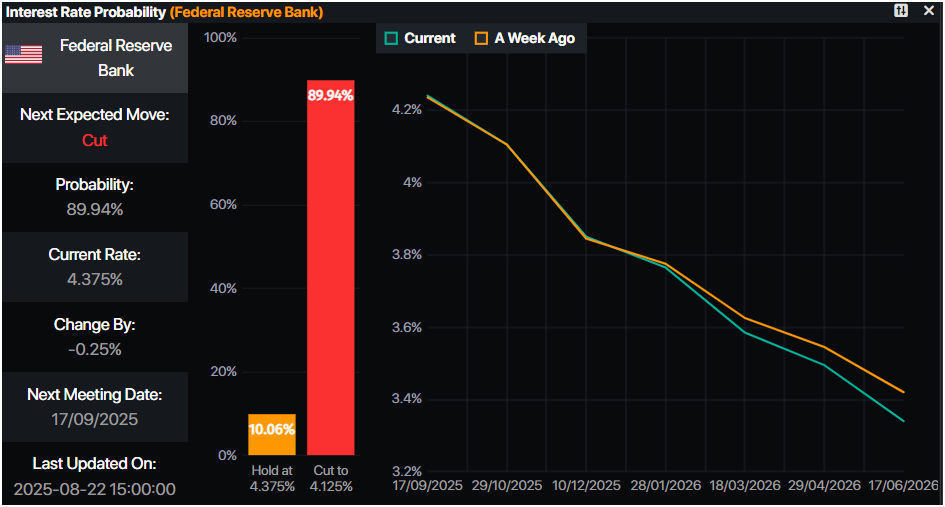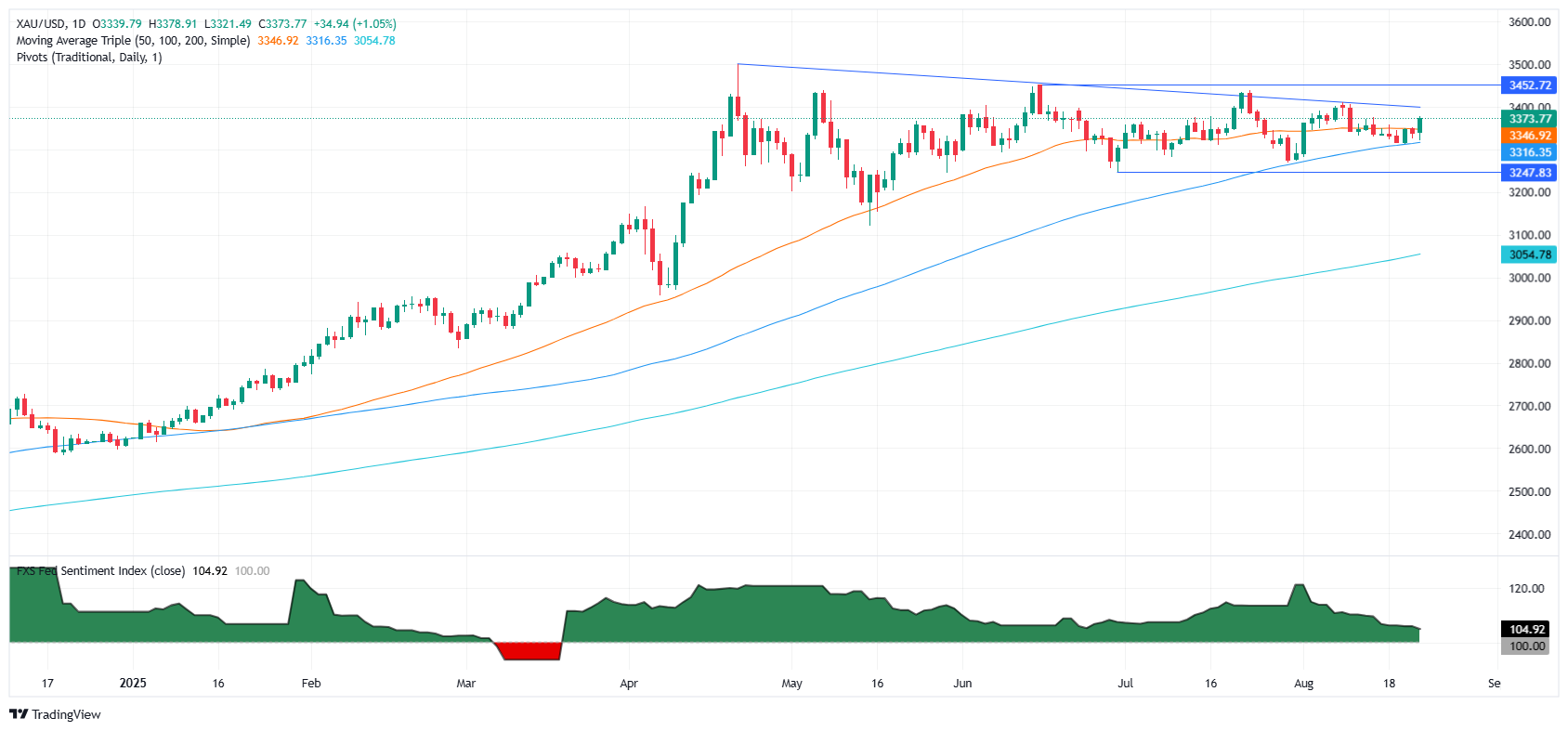- Gold costs rallied sharply after Powell’s dovish tone highlighted employment dangers regardless of persistent upside dangers to inflation.
- Merchants priced in a 90% chance of a 25 basis-point Fed reduce, with key knowledge nonetheless forward earlier than September.
- Subsequent week’s US docket consists of Sturdy Items, GDP, and the Fed’s most well-liked inflation gauge, the Core PCE Worth Index.
Gold costs proceed to pattern increased on Friday after the Federal Reserve (Fed) leaned dovish, as commented by the Fed Chair Jerome Powell, who stated that “draw back dangers to the labor market are rising.” XAU/USD trades at $3,371 after hitting a day by day low of $3,321.
The day arrived and Powell hinted that there’s a “affordable base case” to suppose that tariffs would create a “one-time” improve in costs. Nonetheless, he acknowledged that dangers to inflation are tilted to the upside and dangers to employment to the draw back, a “difficult scenario.”
After his remarks, Bullion costs initially soared in direction of the $3,350 space earlier than resuming to the upside, heading to a day by day excessive of $3,378 earlier than retreating considerably to present worth ranges.
Market members had priced in a 90% likelihood that the Federal Reserve will reduce 25 foundation factors (bps) from its important reference charge, in keeping with Prime Market Terminal. Nevertheless, there are two inflation prints left and the next Nonfarm Payrolls report on September 5.

Supply: Prime Market Terminal
After Powell’s speech, Cleveland Fed President Beth Hammack stated that she heard that Powell is open-minded in regards to the coverage outlook, and he or she reiterated her stance to get inflation again to focus on.
Subsequent week, the US financial docket will characteristic Fed speeches, Sturdy Items Orders, CB Shopper Confidence, GDP figures, Preliminary Jobless Claims, and the Fed’s most well-liked inflation gauge measure, the Core Private Consumption Expenditures (PCE) Worth Index.
Day by day digest market movers: Gold boosted by hypothesis of September charge reduce
- Following Powell’s remarks, US Treasury yields tumbled, flattening the yield curve. The ten-year Treasury be aware is down practically seven foundation factors at 4.261%. US actual yields —that are calculated from the nominal yield minus inflation expectations— are down seven bps at 1.871% on the time of writing.
- The US Greenback Index (DXY), which tracks the efficiency of the USD towards a basket of six currencies, drops greater than 1% to 97.55.
- Fed Chair Powell stated, “The baseline outlook and the shifting stability of dangers could warrant adjusting our coverage stance.” He added that “the steadiness of the unemployment charge and different labor market measures permits us to proceed fastidiously.”
- Cleveland’s Fed Beth Hammack added that the Fed is a small distance away from the impartial charge and that the “Fed must be cautious about any transfer to chop charges.” She expects an increase in inflation and within the unemployment charge.
Technical outlook: Gold worth surges in direction of $3,400
Gold worth has risen sharply, but it surely stays shy of testing the $3,400 mark. Bulls emerged on Powell’s remarks however stay cautious as geopolitical threat had de-escalated following upbeat information in the beginning of the week, concerning Russia and Ukraine.
If XAU/USD climbs previous $3,400, the following resistance could be the June 16 excessive of $3,452, forward of the document excessive of $3,500. On the flipside, the $3,300 determine could be the primary demand zone.
Conversely, if Bullion retraces, it may halt its cease on the 50-day Easy Transferring Common (SMA) at round $3,350. On additional weak spot, the 20-day SMA at $3,345 is up subsequent, adopted by the 100-day SMA at $3,309.

Fed FAQs
Financial coverage within the US is formed by the Federal Reserve (Fed). The Fed has two mandates: to realize worth stability and foster full employment. Its major software to realize these targets is by adjusting rates of interest.
When costs are rising too shortly and inflation is above the Fed’s 2% goal, it raises rates of interest, growing borrowing prices all through the economic system. This leads to a stronger US Greenback (USD) because it makes the US a extra engaging place for worldwide traders to park their cash.
When inflation falls beneath 2% or the Unemployment Fee is simply too excessive, the Fed could decrease rates of interest to encourage borrowing, which weighs on the Buck.
The Federal Reserve (Fed) holds eight coverage conferences a yr, the place the Federal Open Market Committee (FOMC) assesses financial situations and makes financial coverage choices.
The FOMC is attended by twelve Fed officers – the seven members of the Board of Governors, the president of the Federal Reserve Financial institution of New York, and 4 of the remaining eleven regional Reserve Financial institution presidents, who serve one-year phrases on a rotating foundation.
In excessive conditions, the Federal Reserve could resort to a coverage named Quantitative Easing (QE). QE is the method by which the Fed considerably will increase the circulate of credit score in a caught monetary system.
It’s a non-standard coverage measure used throughout crises or when inflation is extraordinarily low. It was the Fed’s weapon of alternative in the course of the Nice Monetary Disaster in 2008. It entails the Fed printing extra {Dollars} and utilizing them to purchase excessive grade bonds from monetary establishments. QE normally weakens the US Greenback.
Quantitative tightening (QT) is the reverse means of QE, whereby the Federal Reserve stops shopping for bonds from monetary establishments and doesn’t reinvest the principal from the bonds it holds maturing, to buy new bonds. It’s normally constructive for the worth of the US Greenback.




























